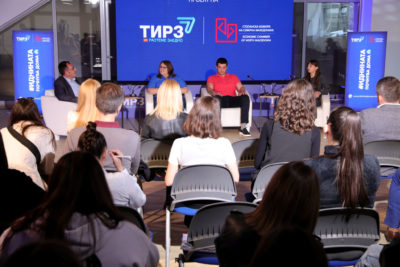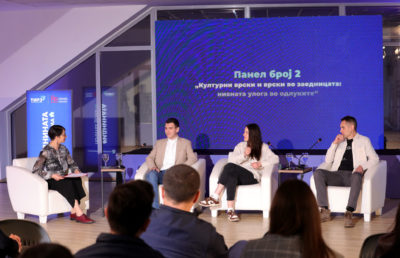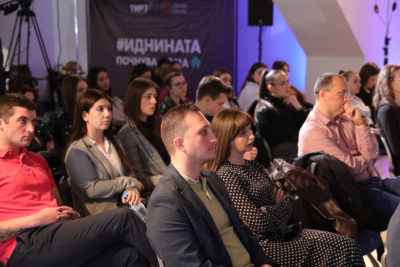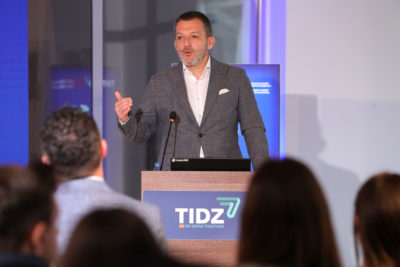THE AMBASSADORS OF THE TIDZ PROJECT “THE FUTURE BEGINS AT HOME” WITH THE MESSAGE: CHANGE IS POSSIBLE AND STARTS WITH EACH OF US INDIVIDUALLY
TIDZ and the Ambassadors of the Project “The Future Begins at Home” started with a series of panel sessions aimed at creating specific proposals, initiatives and measures to encourage and implement positive changes in society, with a focus on young people.
At the first event under the title “How to the Future at Home”, the main topics were education and culture, with a special reference to the role of young people in making decisions. The panellists, Marija Petrova, assistant at the Faculty of Architecture, Nikolija Zlatevska, high school student, Stefan Pop-Acev, entrepreneur, Martina Barakoska, musician, Dino Imeri, one of the most renowned Macedonian pianists and professors, and Darko Arsovski, an activist and member of the “On the Wheel” initiative – all part of the first generation of Ambassadors within the Future Begins at Home project, shared their experiences and recommendations as inspiration for the next generation of young leaders.
The participants jointly concluded that the good standard and quality of life in general, air, education, health, culture, sports, art is what every young person in the country lacks. These are the foundations and goals towards which the “The Future Begins at Home” project strives, and it represents something that every young person can get immediately in one of the European capitals, with just one flight of low-cost airline companies.
According to the participants in the panel dedicated to education, it is crucial for students to have more practice and opportunities to participate in projects, as well as greater synergy between business and education.
Nikolija Zlatevska, high school student at “Vasil Antevski Dren”, intern at TIDZ and one of the Ambassadors of the Community Project in general, not only young people, need something new, creative and attractive and that is the basic task that will be worked on within of the “The Future Begins at Home” Project. “All students who go on exchange or projects through the EU Erasmus program, on youth exchange programs like the American JES program, motivate other young people to then take the next step, which is to create their own projects to help the community and they will build themselves”, said Zlatevska.
 Marija Petrova, assistant at the Faculty of Architecture at UKIM and one of the Ambassadors of the Project emphasized that the educational process of young future professionals is a special challenge, because, as the statistics have shown, young professionals are the ones who are missing in our positive future scenarios. “I would like to emphasize the importance of education and our involvement in it, for which, I suppose, with our discussions we will come across several thoughts, visions and strategies that will not aim to solve this problem in its entirety, but if one is implemented part of them, maybe space will be opened for further future and successful development of our society. For the intellectual capacities of young people, our society does not offer enough space for progress and challenges, so with their intellectual superiority in a way, they get lost in what is everyday activities and look for their place for development in external companies, but also by emigrating are from our country. “Education is never free, we pay for it with our work,” said Petrova.
Marija Petrova, assistant at the Faculty of Architecture at UKIM and one of the Ambassadors of the Project emphasized that the educational process of young future professionals is a special challenge, because, as the statistics have shown, young professionals are the ones who are missing in our positive future scenarios. “I would like to emphasize the importance of education and our involvement in it, for which, I suppose, with our discussions we will come across several thoughts, visions and strategies that will not aim to solve this problem in its entirety, but if one is implemented part of them, maybe space will be opened for further future and successful development of our society. For the intellectual capacities of young people, our society does not offer enough space for progress and challenges, so with their intellectual superiority in a way, they get lost in what is everyday activities and look for their place for development in external companies, but also by emigrating are from our country. “Education is never free, we pay for it with our work,” said Petrova.
According to Stefan Pop Acev, who is an entrepreneur and owner of the company Bismak, he believes that education provides a foundation, but does not guarantee a job. According to him, practice is very important, and young people and employees should be given good working conditions in order to stay at home. “One of the reasons why young people stay in the country is digitization, which enables them to work from abroad from home. Not every job can be done from home, but even those who work from a workplace, it is important to be able to understand the employees with humanity and to have flexible working hours, when the work is finished earlier then the employee can he left, but if not, he wants to stay to complete it,” says Pop Acev. He also proposes a reform of master’s studies, where instead of students sitting in lectures, they will be able to gain work experience and practice on a project under the mentorship of professors.
The main message is that these young Ambassadors believe that change comes from each of us individually, and all together can encourage greater changes in society. “Whether you are a musician in Paris, London or the Balkans, everywhere we face the same problems and challenges. What makes you different is how you deal with them. We humans are more similar than different. Yes, there are big differences in terms of the conditions in which our colleagues and students engage in the activity in another setting, but that does not always mean that it is better. The fact that we didn’t have perfect conditions here forced us to be more creative and grow. That’s how I realized that it’s not important where you will be, but what you will be,” said Dino Imeri.
And Martina Barakoska believes that getting out of stereotypes and dealing with challenges is key to progress. “If you want to change something, you have to start with yourself. Also, the culture must be built in the society and thus the values in that society will be built,” said Martina, who went beyond the stereotypes that a girl can’t be a drummer, and is now teaching new generations of musicians, most of whom are girls.
For Darko Arsovski, it is very important to start actions from the “On the wheel” initiative, even if at the beginning you have negative comments. “The On the Wheel initiative started on Twitter and developed into a movement of activists. That’s how we managed to fight for wheel lanes on streets, to remove cars that were parked on those lanes and a number of other successes. When the public is involved, the government does what the public demands, only as it knows and knows how,” said Arsovski.
A part of the Study of Demographic Movements was also presented at the event, in which the figures are devastating and worrying. The population is declining, and with it the age structure is also changing – the able-bodied population from 15 to 64 is decreasing, and the population over 65 is increasing. According to the presented scenarios, the country would remain with about 1,400,000 inhabitants until 2070, while over 90 percent of the young people who have already gone abroad do not want to return.
 “It is not necessary to just talk on camera and state that “we have a problem”, but we must work seriously. It was not by chance that we chose two interesting topics – education and culture, which seem to have nothing to do with the economy, topics that play a big role on people when they think about whether to stay here or leave. We are giving the opportunity to six young people from the 32 Ambassadors of the “The Future Begins at Home” project to create a document with their specific proposals, and the document will then be forwarded to the public and all stakeholders. Practically, we enable young people to directly build policies and plans so that all those things can be implemented in practice and so that everything we have here, as a society and community, becomes much more attractive for all of us,” said Jovan Despotovski, director at the beginning of TIDZ.
“It is not necessary to just talk on camera and state that “we have a problem”, but we must work seriously. It was not by chance that we chose two interesting topics – education and culture, which seem to have nothing to do with the economy, topics that play a big role on people when they think about whether to stay here or leave. We are giving the opportunity to six young people from the 32 Ambassadors of the “The Future Begins at Home” project to create a document with their specific proposals, and the document will then be forwarded to the public and all stakeholders. Practically, we enable young people to directly build policies and plans so that all those things can be implemented in practice and so that everything we have here, as a society and community, becomes much more attractive for all of us,” said Jovan Despotovski, director at the beginning of TIDZ.
The series of panel sessions continues in the next period, with different topics from everyday life, especially with a focus on young people.


